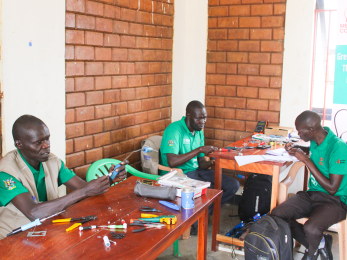Role of Markets In Strengthening Social Resilience Capacities in Northeast Nigeria

In protracted crises, where the state has limited capacity or lacks the political will to provide for and protect its citizens, people rely on markets and social connections for protection, information, and economic resources. Resilience capacities such as agency and confidence in the future are equally important. But how might aid interventions in protracted crises develop these important sources of resilience? Early evidence from two economic recovery interventions in Northeast (NE) Nigeria found that a combination of livelihood-support and economic collectives such as VSLAs helped develop financial and social sources of resilience through three pathways.
1. Livelihood support and VSLAs in conflict settings contributed to women’s self-esteem, confidence, and agency, and shifted men’s perceptions about women’s roles.
2. Interventions increased participants’ confidence in their capacity to deal with future shocks.
3. Market-based livelihood interventions and VSLAs helped to strengthen and diversify social connections, catalyze economic activity, and promote psychosocial well-being.
Being aware of these pathways helps practitioners understand why and how people are using these economic and social sources of resilience, which is important for effective program design.
Resilience Rapid Learning Series
Lessons for Building Resilience in Protracted Crises and Conflict-affected Settings
The Resilience Rapid Learning Series provides practitioner and donor communities with insights and emerging evidence on how to build resilience in protracted crises and conflict-affected settings by documenting promising program approaches and contextual insights.
This series was inspired by a Conflict and Resilience Roundtable in June 2020, organized by the Resilience, Evaluation, Analysis and Learning (REAL) Award and the USAID Center for Resilience, and framed by Mercy Corps’ paper Towards Resilience: Advancing Collective Impact in Protracted Crises.
Research questions for each brief in this series align with the framework presented in the Towards Resilience paper, calling for collective action around three practice areas to drive resilience:
- Rapid, real-time analysis of risk factors that drive and perpetuate fragility.
- Support to local market and social systems to strengthen sources of resilience to the shocks and stresses defining protracted crises.
- Short-term violence prevention paired with efforts to transform the structural drivers of conflict.
Other briefs in this series include:

